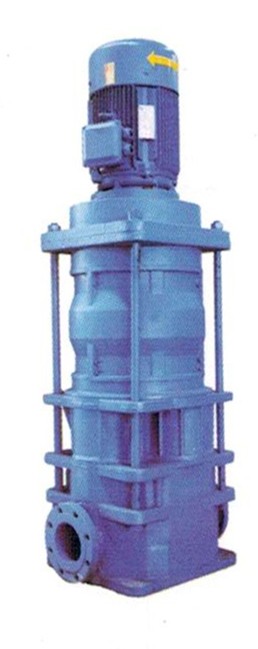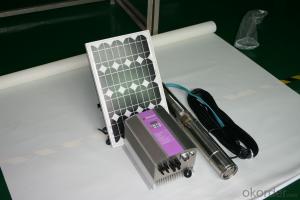Franklin Solar Pump L3D-20-360 Solar Water Pump
- Loading Port:
- China Main Port
- Payment Terms:
- TT OR LC
- Min Order Qty:
- -
- Supply Capability:
- 300 sets set/month
OKorder Service Pledge
OKorder Financial Service
You Might Also Like
Product description:
Product: Solar water pump
Model:L3D-20-360
Appilication:
surface pump
for surface water of pond, river, lake
for irrigation of a big farm with 10000 m2 on the top of a high mountain
Product specification:
flow rate:20m3/ hour, 140m3/day.
lift: 10m-360m
pump diameter: 610mm
Pump installed on the ground, outlet to the water surface:4m
with AC motor, motor power:22kW
but only need solar power:24kW(while Grundfos pump needs at least 45kW solar power, our pump can save more than 50% solar panel power,save USD15000 cost for solar panel per set.
Material:
Pump inside: stainless steel and wearable nylon,it enables our solar pump to have 10 years sevice life.
Motor : AC motor, 380V , three phase , 50Hz. The pump also can connect with grid power directly.
Certification:
3 International patent
ISO9001
CE
Warranty:2 years
- Q: Can a solar pump work at night or on cloudy days?
- No, a solar pump relies on sunlight to generate electricity, so it is not able to operate at night or on cloudy days when there is limited or no sunlight available.
- Q: How does the performance of a solar pump vary with different water quality parameters (e.g., turbidity, pH)?
- The performance of a solar pump can vary with different water quality parameters such as turbidity and pH. Higher turbidity levels in water can reduce the efficiency of the solar pump as it affects the amount of sunlight that can penetrate the water surface, decreasing the solar panels' ability to generate electricity. Additionally, the presence of suspended particles in turbid water can lead to clogging of the pump system, further impacting its performance. pH levels can also affect the efficiency of the solar pump. Extreme pH values, either too acidic or too alkaline, can potentially damage the pump components, affecting its overall performance. Therefore, it is crucial to consider water quality parameters when operating a solar pump to ensure optimal and consistent performance.
- Q: Can solar pumps be used for water supply in public parks or gardens?
- Yes, solar pumps can be used for water supply in public parks or gardens. Solar pumps are a sustainable and efficient solution for providing water in outdoor spaces, as they utilize renewable energy from the sun. They can help reduce electricity costs and environmental impact while ensuring a reliable water supply for maintaining green spaces in public parks or gardens.
- Q: Does the balcony wall - mounted solar energy require a circulating pump?
- If your collector is higher than the tank, or because the pipeline climbing and other reasons can not be a natural cycle, it is necessary to increase the circulating pump.
- Q: How does a solar pump handle water pH levels?
- A solar pump does not directly handle water pH levels. Its primary function is to circulate water using solar energy. However, depending on the type of solar pump and its components, it may indirectly affect the water pH levels by facilitating water movement and aeration, which can help in maintaining a balanced pH level in certain situations.
- Q: Can a solar pump be used for irrigation of crops or gardens?
- Yes, a solar pump can be used for irrigation of crops or gardens. Solar pumps are designed to harness the power of the sun to pump water from a source, such as a well or a pond, to the desired location. These pumps are particularly useful in areas where access to electricity is limited or non-existent. Solar pumps for irrigation provide a sustainable and cost-effective solution for farmers and gardeners. They can be used to irrigate fields, orchards, vineyards, and gardens of all sizes. The solar panels convert sunlight into electricity, which powers the pump to draw water from the source and distribute it to the desired area. One of the major advantages of using solar pumps for irrigation is their low operating cost. Sunlight is free and abundant, so once the system is installed, there are no fuel or electricity costs associated with running the pump. This makes solar pumps an economically viable option, especially for small-scale farmers and gardeners. Additionally, solar pumps are environmentally friendly as they do not produce any greenhouse gas emissions during operation. They also reduce dependence on fossil fuels, contributing to a cleaner and more sustainable energy future. Solar pumps come in various sizes and capacities, allowing for customization based on the specific irrigation needs of crops or gardens. They are designed to be durable, reliable, and require minimal maintenance. In conclusion, solar pumps can indeed be used for the irrigation of crops or gardens. They provide a sustainable and cost-effective solution, while also reducing environmental impact. With advancements in technology, solar pumps have become increasingly efficient and reliable, making them an excellent choice for irrigation purposes.
- Q: What is the cost of installing a solar pump system?
- The cost of installing a solar pump system can vary depending on various factors such as the size of the system, the location, and any additional requirements. On average, the cost can range from $5,000 to $20,000, including the equipment, installation, and necessary permits.
- Q: Do solar pumps require regular maintenance?
- Yes, solar pumps require regular maintenance to ensure optimal performance and longevity. This may include cleaning the solar panels to maximize sunlight absorption, checking and adjusting the pump's settings, inspecting and replacing worn-out parts, and monitoring the overall system for any issues. Regular maintenance helps to prevent breakdowns, improve efficiency, and extend the lifespan of solar pumps.
- Q: What is the maximum temperature a solar pump can handle?
- The maximum temperature that a solar pump can withstand may differ based on the specific model and manufacturer. Nevertheless, most solar pumps are generally built to endure temperatures ranging from 50-60 degrees Celsius (122-140 degrees Fahrenheit). To determine the exact maximum temperature rating for a particular solar pump model, it is crucial to consult the manufacturer's product specifications. Moreover, it is recommended to install the pump in a location that reduces exposure to extreme temperatures and guarantees sufficient ventilation for optimal performance and longevity.
- Q: Can a solar pump be used for water supply in a refugee camp?
- Yes, a solar pump can be used for water supply in a refugee camp. Solar pumps are a sustainable and cost-effective solution for providing clean and reliable water in areas without access to electricity. They can draw water from wells, rivers, or other water sources and provide a consistent supply of water for drinking, cooking, and sanitation purposes in a refugee camp. Additionally, solar pumps have low maintenance requirements and are environmentally friendly, making them an ideal choice for water supply in such settings.
Send your message to us
Franklin Solar Pump L3D-20-360 Solar Water Pump
- Loading Port:
- China Main Port
- Payment Terms:
- TT OR LC
- Min Order Qty:
- -
- Supply Capability:
- 300 sets set/month
OKorder Service Pledge
OKorder Financial Service
Similar products
Hot products
Hot Searches
Related keywords


















